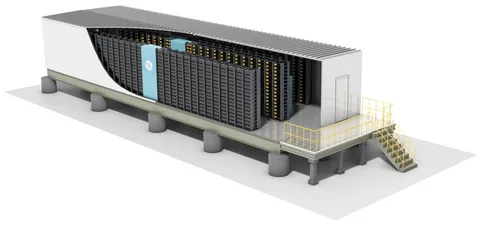The global energy landscape is undergoing a major transformation. With an increasing focus on reducing carbon emissions and transitioning to renewable energy sources, the need for efficient and reliable energy storage has never been greater. The Battery Energy Storage System (BESS) has emerged as a pivotal technology that addresses the inherent challenges of renewable energy and offers a sustainable solution for future energy needs.
At Shakarzahi LLC, we are committed to advancing energy sustainability through cutting-edge battery energy storage systems. These systems enable efficient energy storage from renewable sources like solar and wind, ensuring continuous power supply and optimizing energy use. In this article, we explore the significance, benefits, and future of battery energy storage systems, illustrating how they will shape the future of energy sustainability.
Understanding Battery Energy Storage Systems
A Battery Energy Storage System (BESS) is an innovative technology that stores electrical energy for later use. Unlike traditional power systems, BESS allows energy to be stored when it is generated, often during periods of low demand or high renewable energy output, and discharged when needed. This capability is crucial for managing the variability of renewable energy sources, such as solar and wind power, which depend on weather conditions and time of day.
A typical BESS comprises components such as batteries, inverters, and software that control the charging and discharging processes. The most commonly used batteries in these systems are lithium-ion, known for their high efficiency, long lifespan, and rapid response times.
Key Benefits of Battery Energy Storage Systems
1. Enabling Renewable Energy Integration
One of the greatest advantages of a battery energy storage system is its ability to enhance the integration of renewable energy. Renewable sources, by their nature, are intermittent—solar power is available only during daylight hours, while wind energy fluctuates with weather conditions. BESS helps to overcome these limitations by storing excess energy generated during peak production periods and supplying it during periods of high demand or when renewable sources are not available. This ensures a steady and reliable supply of clean energy, reducing the need for fossil-fuel-based power generation.
2. Energy Independence and Reliability
Battery energy storage systems also provide energy independence for homes and businesses. By storing energy during off-peak hours, users can reduce their reliance on the grid and manage energy costs more effectively. In cases of power outages or grid instability, a BESS can provide backup power, ensuring uninterrupted operation of essential systems. For businesses that depend on continuous energy, this is a significant advantage.
3. Cost Savings
The ability to store energy when prices are low and use it during peak demand times translates to considerable cost savings for consumers. BESS systems enable users to shift their energy consumption away from peak hours, avoiding high electricity rates and reducing overall energy costs. In addition, businesses can avoid demand charges by using stored energy to manage spikes in power usage.
4. Reducing Carbon Emissions
By optimizing the use of renewable energy, battery energy storage systems help reduce carbon emissions. As more energy is sourced from renewable plants and less from fossil fuels, the carbon footprint of energy consumption decreases. This not only contributes to environmental sustainability but also aligns with global efforts to combat climate change.
Applications of Battery Energy Storage Systems
Battery energy storage systems are versatile and have broad applications across various sectors:
1. Residential Energy Storage
For homeowners with solar panels or other renewable energy installations, a BESS can store excess energy generated during make it available at night or during outages. This enhances energy independence and can lead to significant savings on electricity bills.
2. Commercial and Industrial Use
Businesses and industrial facilities can benefit from battery energy storage systems by managing their energy use more efficiently. By storing energy during low-cost periods and using it during high-demand times, companies can reduce energy expenses and enhance operational reliability. BESS also helps industries that require consistent power supply to avoid costly interruptions.
3. Utility-Scale Storage
At the utility level, battery energy storage systems are being deployed to manage the growing share of renewable energy on the grid. Utility-scale BESS helps balance supply and demand, improve grid stability, and provide backup power during outages. This supports the transition to a greener, more resilient energy grid.
4. Electric Vehicle Charging
As the adoption of electric vehicles (EVs) increases, battery energy storage systems are playing a vital role in supporting EV charging infrastructure. BESS enables the storage of energy for charging during off-peak hours, ensuring that EV charging stations remain operational during peak demand times. This improves the efficiency and reliability of the EV charging network.
The Future of Battery Energy Storage Systems
The future of energy storage is promising, with innovations in battery technology paving the way for more advanced and affordable systems. Research and development in battery chemistry, particularly lithium-ion alternatives, aim to improve energy density, extend battery life, and lower costs. As a result, battery energy storage systems are expected to become more accessible to a wider range of consumers and industries.
At Shakarzahi LLC, we are proud to be at the forefront of this evolution, offering advanced BESS solutions designed to meet the diverse energy needs of today and tomorrow. Our systems are built to optimize energy use, reduce costs, and contribute to a more sustainable energy landscape.
Conclusion
As the world embraces renewable energy as the cornerstone of future power generation, battery energy storage systems have become an essential component of the energy transition. These systems not only enable the efficient use of renewable energy but also provide cost savings, energy independence, and improved grid stability. By integrating BESS into energy infrastructures, businesses, homes, and utilities can take significant steps toward a sustainable and reliable energy future.
At Shakarzahi LLC, we are dedicated to providing high-performance battery energy storage systems that empower users to optimize energy use and contribute to a cleaner, greener future. With continued advancements in technology, BESS will play an even greater role in shaping the future of energy sustainability.




